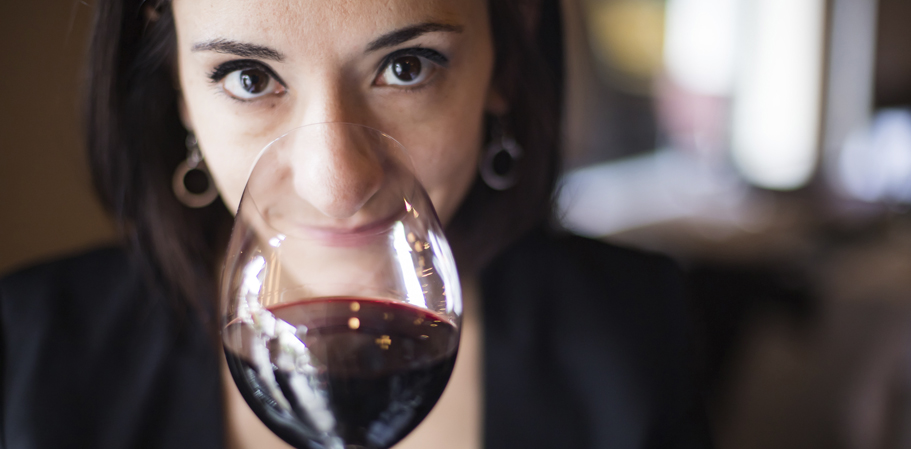An interview with Valeria Gamper

We chatted with Valeria Gamper a few days after the 2 September final of Argentina’s Best Sommelier competition held at the Usina del Arte. After competing and being selected as a finalist on various occasions, her recent victory was well deserved. Here, she shares with us her goals, her vision of Argentine sommellerie, and her thoughts on industry trends and the new crop of sommeliers.
You’ve competed several times in this competition. What made the difference this time round? How did you change to persevere and finally achieve this honour?
VG: Each competition entails preparing one’s studies from scratch but, at the same time, from foundations that have already been laid. You always need to be attentive to things that are changing. Personally, I try to approach every year, every competition, all my studies, with new techniques, testing what works for me and what best serves me. All the techniques – videos, apps, maps and so on – are learning tools; the information ends up coming from many sources.
I’m also self-critical. I tell myself ‘I was very lazy in this area’ when I approach it anew, and don’t allow myself to coast on the stuff with which I feel comfortable. The easy thing is to take off to France, Bordeaux, Burgundy or, in my case, Spain, but the idea is to try to break out of that habit and research outside of my comfort zone. Believe it or not, it's the most relaxed I’ve been.
Having achieved this gives me a great deal of joy, and I felt I owed it to myself. In any case, I felt very at ease on completing the semi-final and was pretty pleased with my efforts, even if I hadn’t had gone on to the final. I was a little tired of competing every two years, getting ready in time, and forever thinking of the competition, so if I hadn’t made it to the final, it still would have been a lovely ending. I don't know if it changes me that much, but it does enable me to compete in the Pan-American cup, which I think is a very enriching experience. I met a lot of people there, learned a lot and I wasn’t the same when I returned. I recalculated, seeing the full potential of Argentina even with all the limitations.
What new goals have you set for yourself? What would you like to accomplish?
VG: With regard to sommellerie, I would love to do tastings for a publication, something like Decanter, or for some international wine competitions. I believe that kind of experience would enhance my tasting abilities. And writing, I would love to write about what’s happening in Argentina, about the producers, the wines, the small places that are making wines; I’d be passionate about this.
Where do you think Argentine sommellerie stands in relation to the rest of the world? What are the new challenges?
VG: I believe Argentine sommellerie is at a really high level, much higher than it’s ever been. There are loads of people entering the profession and I believe that’s because there’s more work available in the field, which is great. It’s no longer limited to restaurant work: there are publications, writing, media, radio, TV, or businesses, education, tons of options, and it’s wonderful. When I was starting out, these options didn’t exist.
We have the usual challenges, such as producers who are having a difficult time accessing products from outside the country and, in the end, this removes you somewhat from what is happening in other parts of the world. But I believe Argentina’s name is steadily gaining a weightier reputation.
What would you share with students who are starting out? Many are afraid to enter a competition or feel it's too much exposure.
VG: I'd tell the sommeliers who are just starting out to explore if they really want to follow this path. Professional skills are increasingly on open display, they’re on the internet, and those entering the profession can determine whether or not the job is for them. They can also try the SOMM2025 project, which is a really interesting programme for students. Especially for those who aren’t interested in competitions but wish to improve their skills and advance. Personally, I always recommend entering a competition, even if it’s just once, because you’ll never be the same again. You meet a lot of people, connect with what’s going on outside the country and the Argentine competition is very aligned with those held internationally. It's good to give yourself that opportunity to see new things, to see sommellerie differently, to better understand our context. I think the result is always positive, always, regardless of the finish, which is just a moment. You can prepare very well and finish fourth, last or first, but you’ll never be the same person.
How did you end up in this career? What was it about wine that so inspired you?
VG: I entered this career because I studied Hospitality at university and enrolled on a bartending course in freshman year. The instructor was very inspiring and over the course of 10 classes, some were dedicated to wine but they were quite basic. I figured there had to be something more to it. Later, as a school requirement, I undertook an internship in one of the nerve centres of a hotel, I worked in food and beverages, and since no one seems to want to start out there, in service, I didn’t have a hard time getting it. I didn't even know how to make tea or coffee, I had no idea about anything, but I sensed there was a lot more behind a dish, a drink or a coffee. What you bring to people – what they feel when they eat, drink, combining the two or travelling – is great. I thought it was something magical, so I did another food and beverage internship as a sophomore at another hotel, then a third at the Four Seasons, where I stayed six years. The wine list at that time was very good but had nothing to do with today’s wines. To begin with, there was no sommelier on the premises, there were, in fact, very few in the country. Where a five-star hotel today has between four and five sommeliers, at that time there were none. When I started studying sommellerie, I fell completely in love with it. I started my studies without actually drinking wine, I mean, I had a glass every six months, it wasn't my drink of choice when I was 23. And I fell in love with it, what it creates, the magic, that it brings people together, the chemistry created with food or even with travel. There are cooks who take you travelling with their dishes, and there are sommeliers who take you to far-flung vineyards with a glass of wine.
On what should new generations of sommeliers focus?
VG: I think that, beyond the path of their careers, new generations have to focus on doing it with passion, with great professionalism, technique and a good deal of seriousness. Because, just as I told you that a certain instructor inspired me – and I doubt he even knows – they, too, can inspire others. I think it's good that our world, our profession, continues to grow, that more people continue to enter it and that they have an expanded field in which to work. Understand the importance of a sommelier as a link to the industry; I don’t think it’s important where each one is involved, it needs to be with a sense of commitment and passion.
With regard to the sommelier competition, would you add anything or otherwise make changes?
VG: The nice thing about the competition is having no idea what might happen and just giving yourself up to the experience. It's also a way to measure yourself and see where the bar is. It's good that new tests are added every year; it’s evolving, being modernized. People also have fun with the experience. Though it’s nerve-racking for us, there’s so much enthusiasm and admiration. People ask me: “How can you identify a wine that way?” Well, that's what a sommelier does. I particularly wouldn't change anything, it’s different each year so it’s great as it is. That’s what makes it fun.
With regard to service, do you think the traditional rituals of the sommelier are the prevailing trend?
VG: With regard to service, the sommelier has to be involved in everything. There are restaurants where they adhere to a stricter protocol, whether the service is longer or more formal, and there are others where it’s much less structured but the service charge won’t be the same. So, there are different styles of service and I think a sommelier has to be prepared for everything. You could be working in a 40-seat bistro with an 80-bottle wine list but you also have to be prepared to give great service in a three-Michelin star restaurant or a five-star hotel. You need to know how to adapt. Sometimes you’ll get a job that’s very good because it requires you to learn a lot, sometimes another job will affect growth in other ways. You have to be prepared and know everything.
Is there a trend you find most attractive in Argentine wine?
VG: There are a lot of good things going on in Argentina. There are many tastes, and each taste has a trend that best fits what it’s looking for, from natural, organic, biodynamic, orange wines, small producers, new generations of old families, young oenologists, each one getting closer to the consumer. Years ago, winemakers didn't travel much, but today they work a lot in publicity and marketing because people want to know who is behind the wine. There are a lot of trends, the young winemaker, the travelling winemaker, the winemaker who presents tastings and explains about soils or oenology – which is really good – as well as all the different types of wine that are being made: Provence-style rosés, lighter reds, orange wines and natural wines. There are a lot of trends and also a lot of markets.
AAS en video
Novedades

